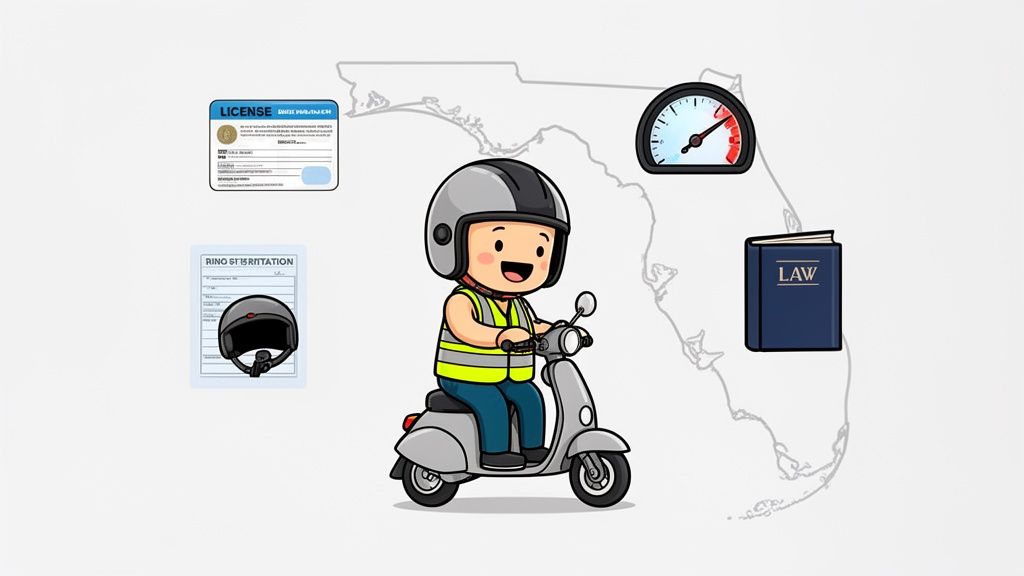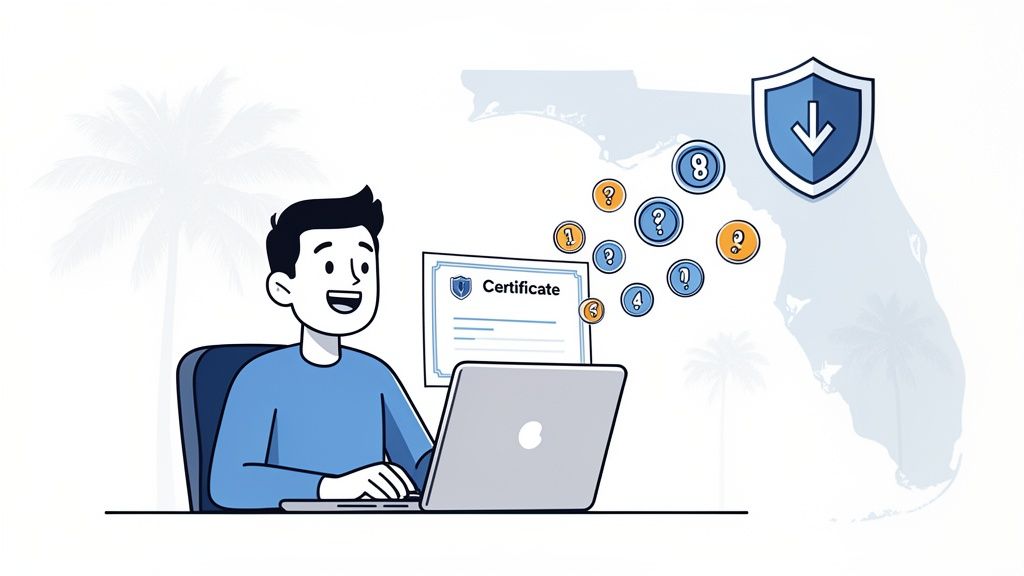Florida teen drivers must complete a state-mandated 4-hour drug and alcohol education program before getting their license. The Florida DETS course covers essential safety topics that can save lives on the road.
We at DriverEducators.com understand that busy families need flexible options. Online DETS courses offer the perfect solution for teens juggling school, sports, and other activities.
What Are Florida’s DETS Requirements for Teens?
Florida’s new law mandates that teens under 18 complete a 6-hour DETS course before they apply for a learner’s permit, effective July 1, 2025. This requirement replaces the previous 4-hour TLSAE program for minors. Teens must reach at least 14 years old to enroll, though they cannot obtain their learner’s permit until age 15. The Florida Department of Highway Safety and Motor Vehicles automatically receives completion reports, which streamlines the process for families.
Age Requirements and Timeline
Teens can start the DETS course at 14 but must wait until 15 to apply for their learner’s permit. Students who completed the old TLSAE course before July 1, 2025, can use their certificate for one full year. After that period expires, they must take the new 6-hour DETS course. Teens with valid out-of-state licenses receive an exemption from this requirement when they transfer to Florida.
Course Structure and Examination
The DETS course requires students to pass a 40-question final exam with 80% accuracy, and they receive three attempts to achieve this score. The curriculum includes five quizzes throughout the program (with a 70% minimum score required for each). Students must demonstrate their knowledge of defensive techniques, traffic laws, drug and alcohol effects, and emergency response procedures. The course automatically saves student progress, which allows flexible completion schedules.
Role in Graduated Driver Education
The DETS course serves as the foundational education component in Florida’s graduated driver education system. Research from the National Highway Traffic Safety Administration shows that teen drivers are two-and-a-half times more likely to engage in risky behaviors when driving with passengers, highlighting the importance of comprehensive driver education programs. The course prepares teens for both their permit exam and real-world situations, setting the stage for the next phase of their education journey.
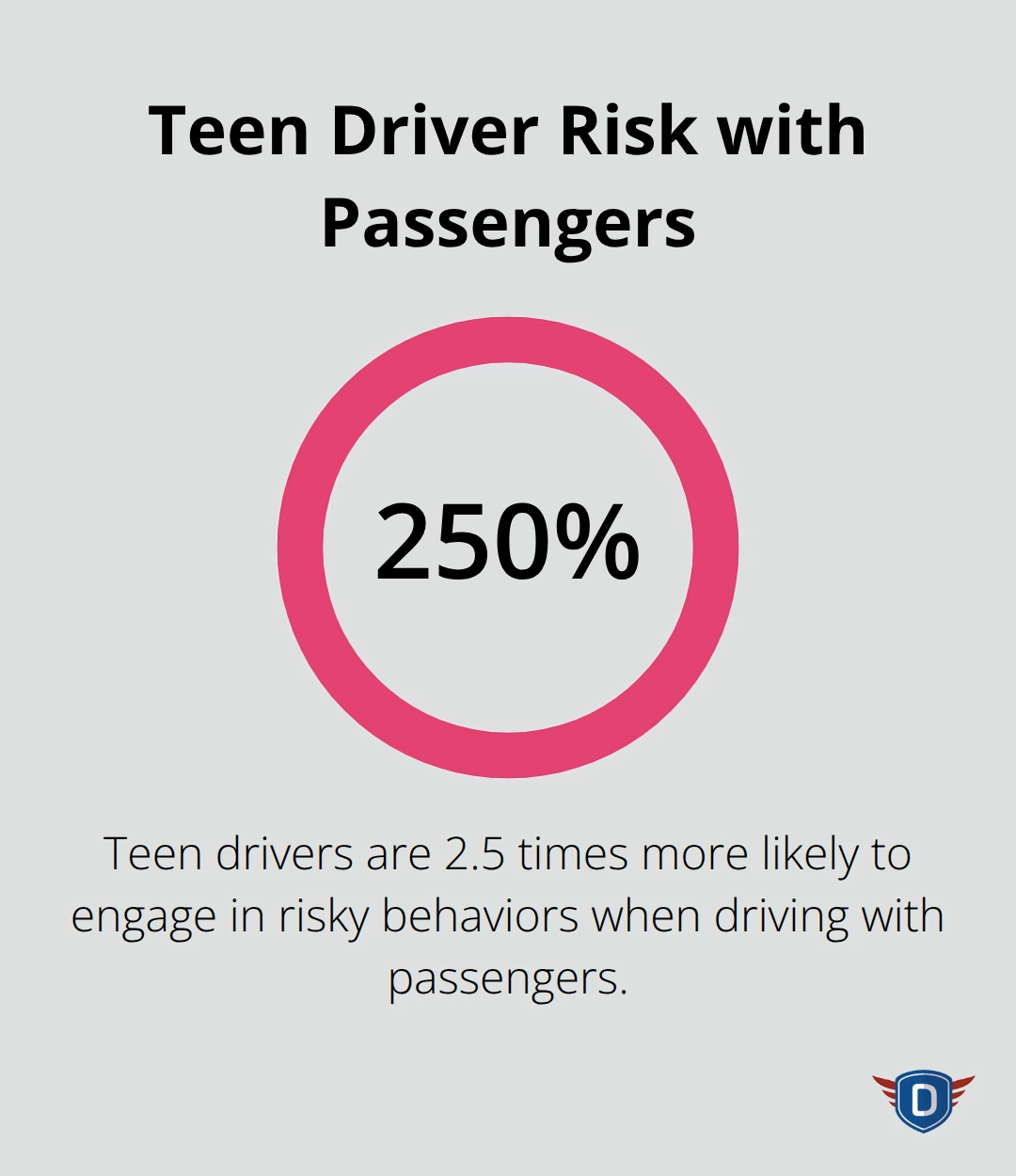
Why Choose Online DETS Over Traditional Classes
Online DETS courses transform teen driver education when they eliminate the rigid schedule constraints that plague traditional classroom programs. Students complete their 6-hour requirement at times that work around football practice, part-time jobs, and family commitments. The American Safety Council reports that 73% of teens prefer online learning because they can pause lessons for homework breaks or family dinners, then resume exactly where they left off. This flexibility becomes essential during busy school weeks when teens might only have 30-minute windows between activities.
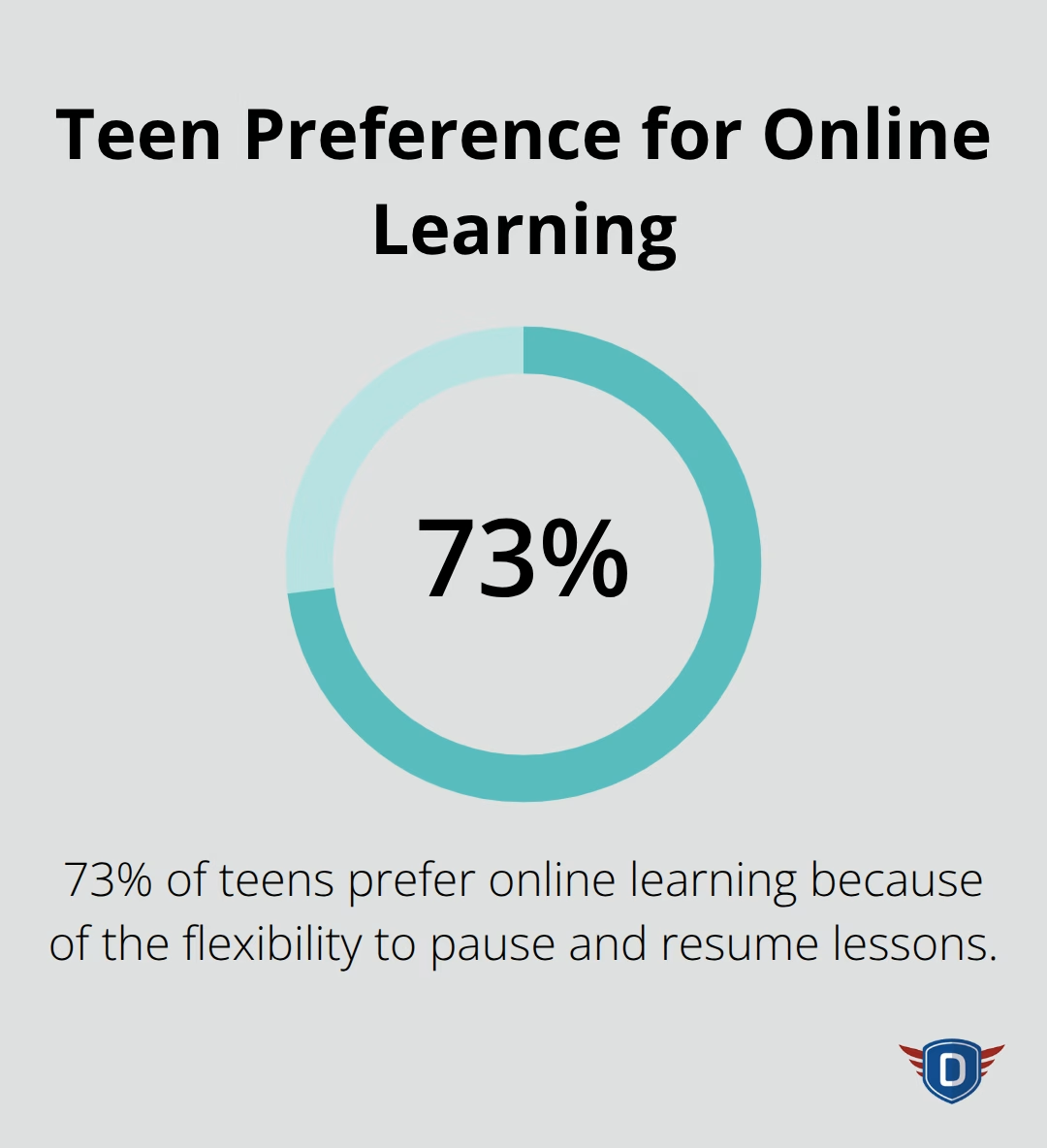
Cost Advantages Add Up Fast
Traditional in-person DETS classes typically charge $89-$125 per student, while online providers offer the same state-approved curriculum for $29-$49. Families save an additional $20-$40 on transportation costs since teens complete coursework from home rather than drive to multiple class sessions. The National Safety Commission found that online students also avoid the hidden costs of printed materials and classroom supplies (which can add another $15-$25 to traditional programs). Parents appreciate these savings, especially when they manage multiple teen drivers or tight household budgets.
Learning Speed Matches Individual Needs
Online DETS courses allow fast learners to complete sections quickly while they give struggling students extra time on complex topics like defensive techniques. Students can replay video demonstrations of parallel parking or highway merging as many times as needed without holding back classmates or feeling embarrassed. Grade 9–11 students in Florida were more likely to earn a grade of C or better when taking an academic course online rather than face to face, likely because they control their learning pace and can revisit challenging material before they move forward.
Technical Features That Support Success
Modern online DETS platforms include interactive quizzes, progress tracking, and mobile compatibility that traditional classrooms cannot match. Students access their coursework from smartphones, tablets, or computers, which means they can study during lunch breaks or while waiting for appointments. The automatic save feature prevents lost progress when internet connections drop or devices need charging. These technical advantages prepare teens for the digital aspects of modern driver education while they build the foundation for selecting the right online provider.
How Do You Select the Best DETS Provider
Florida’s Department of Highway Safety and Motor Vehicles maintains a strict list of approved DETS providers, but not all authorized programs deliver the same quality experience. DetsCourse.com, Highway Traffic School, and Florida Virtual School-FLVS represent the major state-approved options, yet their course features and support systems vary dramatically. The Florida Department of Education requires providers to meet Traffic Safety-Classroom 1900300 standards, which means all courses cover identical curriculum topics like defensive techniques, traffic laws, and substance abuse effects. However, smart families look beyond basic compliance to find providers that offer superior interactive features, mobile compatibility, and responsive customer service that makes the 6-hour requirement manageable for busy teens.
Platform Features That Actually Matter
The best DETS providers include read-along audio features, automatic progress saves, and mobile-optimized interfaces that work seamlessly across devices. DriverEducators.com offers a massive selection of online classes for workplace safety, driver safety, professional certifications and continuing education. Top providers offer included free audio read-along, unlimited quiz attempts and instant feedback on wrong answers, which helps teens master difficult concepts like right-of-way rules or emergency response procedures.
Cost and Certificate Processing Speed
State-approved DETS providers charge between $29-$49 for course access, but hidden fees for certificates or exam retakes can push total costs higher. Choose providers that guarantee automatic reports to FLHSMV and offer a clear all inclusive pricing displayed.
Quality Indicators to Watch For
Look for providers that offer modern features such as study app and video instructions. The best programs include interactive quizzes throughout each section rather than just at the end, which helps teens identify knowledge gaps before they take the final exam. Check whether the provider offers bilingual support if your teen learns better in Spanish, as this feature can significantly improve comprehension and test performance.
Final Thoughts
The Florida DETS course represents a significant step forward in teen driver safety education. Statistics from the National Highway Traffic Safety Administration confirm that comprehensive driver education reduces crash rates among new drivers by 24%. This 6-hour requirement proves a worthwhile investment in your teen’s future safety.
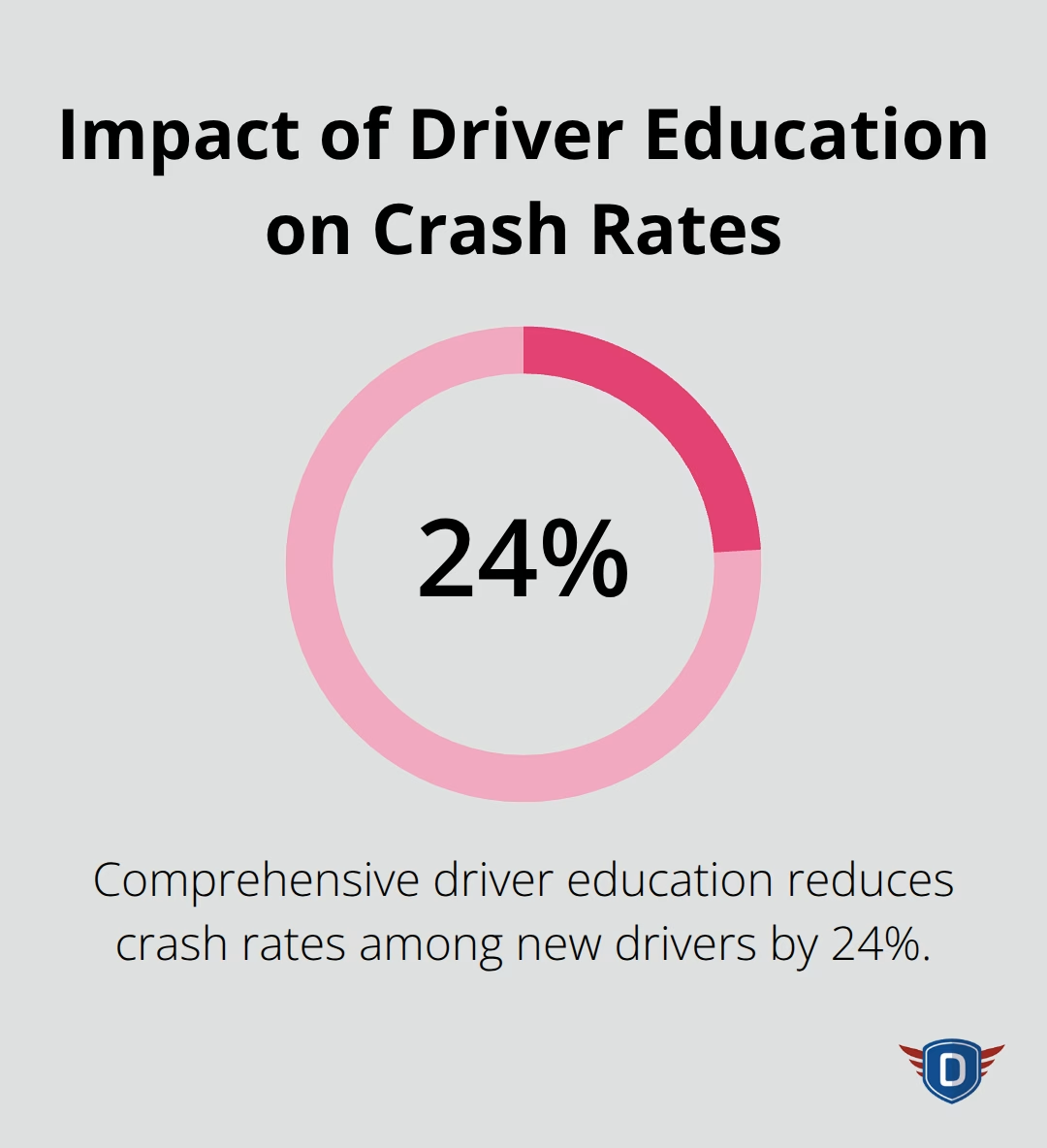
Online completion offers unmatched convenience for families who manage busy schedules. Teens can progress through coursework between school activities, sports practice, and part-time jobs without the constraints of fixed classroom schedules. The flexibility to pause and resume lessons accommodates real-world family demands while it maintains educational quality.
Teens receive automatic completion reports sent to the Florida Department of Highway Safety and Motor Vehicles after they complete the Florida DETS course. They can then schedule their permit exam and begin supervised practice sessions. For families who seek comprehensive driver education beyond state requirements, DriverEducators.com provides personalized instruction from certified professionals who focus on safe habits through supportive environments.

